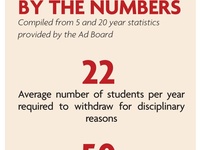Howell says she tries to have “regular check-ins” with students in her House who have been required to withdraw.
But the amount of student-dean communication varies from dean to dean.
Jeff says that his House’s resident dean post was a “revolving door position,” occupied by four different people in the span of his dealings with the Ad Board and his subsequent two-term withdrawal.
Jeff characterized his required withdrawal as a “very isolating” experience: “You lose your Harvard e-mail address, you are forbidden to set foot on campus, forbidden to participate in any extracurriculars,” he says.
The sense of alienation can continue even after students return to campus, Jeff says, since many students required to withdraw gradually lose touch with many of their old friends and acquaintances back on campus.
“You have some spiel [for your peers] about why you were gone for a year, and of course it doesn’t mention the Ad Board,” he says. “But there’s always a hint of comprehension [in their minds].”
Anna and Jeff say they hope to see the College seriously re-evaluate the requirement to withdraw to improve the process for students in the future.
“The College is not a charity, but they should at least have enough ethical awareness to be supportive for the students they are asking to leave,” Anna says.
Administrators agree that the withdrawal process is not without its weaknesses. Howell, for example, called the question of medical insurance “one of the most difficult” issues the Ad Board deals with.
“It’s being thought about,” she says. “There’s definitely a recognition by the College that [the rapid loss of medical insurance does not create] an ideal circumstance.”
—Staff writer Melody Y. Hu can be reached at melodyhu@fas.harvard.edu.
—Staff writer Eric P. Newcomer can be reached at newcomer@fas.harvard.edu.









